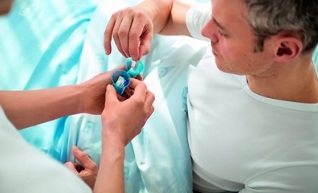
Representatives of the stronger sex in adulthood often experience disorders of the genitourinary system. The reasons for the appearance of unpleasant symptoms are very different, so it can be dangerous to choose a drug for prostatitis in men themselves.
Inflammatory diseases require an integrated approach, as well as diagnostic studies to prescribe proper therapy.
Prostatitis and its manifestations
One of the most common diseases in men is prostatitis, it occurs in almost every fifth representative of the stronger sex after 40 years. This disease brings a lot of difficulties and does not allow a man to live a full life. The disease arises as a result of alcohol abuse, unstable lifestyle, malnutrition, or acute sexual activity.
The main manifestations of this disease are:
- Severe pulling pain in lower abdomen.
- Excretory system disorders.
- Frequent urination, especially at night.
- Unpleasant sensation or pain during intercourse.
- Erectile dysfunction or temporary impotence.
- Foreign substances in urine (blood or pus).
Prostate problems appear suddenly or develop over a short period of time (most often within a week). Afraid to go see a specialist, many men look for a suitable remedy for prostatitis without a doctor's recommendation. Pharmacies today offer a wide variety of medications, and in most cases they do not require a prescription to sell them (except antibiotics). When looking for the right medication, keep in mind that improper therapy or seeking help from a doctor on time can lead to complications of the disease. As a result, prostate adenoma, cancer, infertility and impotence develop easily.
Primary treatment methods
Modern pharmacology offers a wide range of medicines and drugs to combat prostatitis. They all differ in composition, form of release and scheme of use. Specialists prescribe medication for the treatment of chronic prostatitis or in the acute phase, after the patient undergoes a diagnostic examination. You need to undergo a blood test, a urine test, an ultrasound examination.
In the early stages of the disease, when the causative agent of the inflammatory process has not been identified, broad-spectrum drugs are prescribed. Upon receiving the test results, therapy is adjusted, and antibiotics are converted into more specific medications.
What is the best medicine for prostatitis? An expert will help you choose a medication, focusing on the type of disease.
Some examples of common treatment regimens:
- Acute stage of infectious prostatitis (caused by E. coli, Klebsiella, enterococcus, pseudomonas). In this case, antibiotics from the group of cephalosporins or tetracyclines are prescribed. To relieve symptoms, painkillers are used, as well as local suppositories. Complex therapy lasts for 2 weeks.
- Chronic form. Prescription drugs in the form of suppositories or capsules for prostatitis according to a specific scheme. Antibiotics only with increasing disease, at the stage of remission only phytopreparation.
- Prostatitis latent. Antibacterial therapy is prescribed for 14 days, as well as suppositories for local action on the inflammatory process. If the disease does not cause complications, antispasmodics and painkillers are not needed.
- Prostatitis is not contagious. Medications to normalize the outflow of urine, as well as antispasmodics to relieve cramps and edema of the urethra. Pain relief analgesic relief. The course of treatment is 14 days.
The effectiveness of treatment is highly dependent not only on what medication to take for prostatitis, but also on the treatment regimen and method of action chosen correctly. The complex is chosen by specialists, taking into account the need to affect the prostate gland and the inflammatory process in certain ways.
The main group of drugs used by urologists in the treatment of prostatitis:
- Antibiotics.
- Non-steroidal anti-inflammatory drugs.
- Painkillers.
- Immunomodulator.
- Homeopathy and herbal medicine.
The doctor prescribes several types of pills at once or adds a wax with the desired properties to the injection. This is an integrated approach (use of drugs with multiple actions) that allows you to achieve good and effective results in overcoming the disease. Some medications should be taken until the symptoms disappear, others completely. You must adhere to all doctor's recommendations and not violate the prescribed treatment regimen.
Antibacterial drugs

Any inflammatory process is suppressed in the body by antibiotics. Prostatitis caused by infection is no exception. The specialist, after obtaining test results, visual examination, prostate palpation and questioning of the patient, prescribes a course of antibacterial agents.
The appropriate group is selected depending on the type of disease:
- Fluoroquinols.Used for the treatment of diseases that have become chronic, as well as severe. This drug is effective with few side effects. They quickly relieve inflammation and inhibit the growth of pathogenic bacteria.
- Tetrasiklin.Used to treat the acute phase of the disease. The main contraindications for use are leukopenia, as well as renal pathology, possible manifestations of allergic reactions.
- Penicillin.May cause unwanted side effects such as drowsiness, dermatitis, lethargy, tinnitus, and headache. Therefore, it is used with caution in people with chronic kidney and liver disease.
Modern medicine quickly begins to act on problem areas and allows you to overcome the inflammatory process in a few days. Urologists prescribe antibiotics to fight prostatitis, taking into account the patient's health status, the nature of the disease, and even age. Experts take into account proven drug ratings, as well as the latest developments in the market.
Non-steroidal drugs
Anti-inflammatory drugs for the treatment of prostatitis can quickly relieve groin pain, reduce inflammation and reduce the condition significantly. Immediately after taking it, after a few hours, the patient noted a decrease in pain, discomfort and normalization of urination. Non-steroidal anti-inflammatory drugs lower muscle tone in the groin area and thus improve well-being.
Many patients, realizing the changes for the better, ignore taking other medications rather than just worsening the condition. It should be understood that these drugs are taken together with antibiotics and other means.
Alpha blocker for pain relief
Drugs that fall into this category are prescribed to relax muscles, as well as improve the process of urine flow. Such drugs are found in almost all treatment regimens, regardless of the form of the disease (acute phase, chronic stage). Keep in mind that the drugs themselves are no longer intended for treatment, but simply block and remove the main unpleasant manifestations that do not allow a person to live normally.
Immunomodulator to support the body
In the acute phase or form of chronic prostatitis, one can not do without drugs that increase the body's defenses. Modulators have an effect on cell and humoral immunity and contribute to the body's resistance to infection, improve overall tone, and normalize many processes.
Drugs from this group of drugs are used in combination with other drugs and have an effect in the first few hours after administration.
Homeopathy and herbal medicine
Herbal or homeopathic remedies are just as popular as other types of medicine. They are safe for the body and at the same time effective.
The drug is offered in the form of suppositories or tablets. They are sold for free, without a doctor's prescription. Before taking it, it is important to read the instructions carefully and follow the recommended dosage.
Forms of prostatitis medicine

All medicines available in pharmacies differ in their release form. Not everyone knows whether it is a privilege to choose one or another species. It is easier to take tablets, but injections act faster and allow adequate concentrations of active substances to reach the site of inflammation more quickly.
The following forms of medicine are most often prescribed by specialists:
- Injection.One of the best forms of treatment, although accompanied by an unpleasant sensation during the injection. Any treatment regimen for prostatitis almost always begins with the appointment of an injection.
- Rectal wax.Due to its local action, it is this form of medicine that can quickly relieve pain, relieve inflammation, and activate blood flow. Suppositories against prostatitis can be with antibiotics, and also contain non-steroidal anti-inflammatory drugs or anesthetics.
- Pil.The easiest form to use, as it is easily accepted. But through the stomach, the drug enters the bloodstream more severely and the effect may not be the same as other drugs.
The method of treatment and the form of drug release by the doctor are selected based on the general condition of the patient, as well as the need for specific effects. If the therapy is chosen incorrectly or the patient does not follow the prescribed reception schedule, treatment regimen, then prostatitis flows into a chronic form. This form of the disease is more difficult to treat and can lead to serious consequences. Therefore, if there is a problem with the prostate gland, a person can not treat themselves, but immediately contact a competent specialist who will consider all the features of the body and prescribe the right treatment.
























